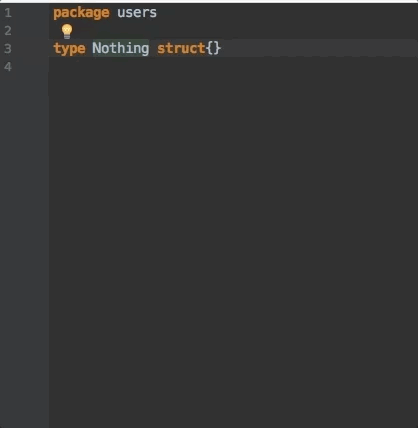I’ve been using Gorm for a while and wanted to see what it would look like to use the standard database/sql package instead.
My main concern was development time since Gorm makes it simple to create the structures needed for simple queries. Basically a lot less typing.
My exploration yielded a pattern that I’ve enjoyed so far. Also, my (not yet very thorough) benchmarks indicate that removing Gorm’s heavy reflection from the program yielded better application performance for large queries.
And I found it easier to do the tricks below since each interface satisfier can tailor their handling of the query, values, and results directly.
Some code:
// libs/db/db.go
package db
import "database/sql"
var db *sql.DB
// Register called from main.go with an instantiated db connection using the std lib's
// sql interface only (with appropriate driver).
func Register(in *sql.DB) {
if in == nil {
panic("db.Register was given a nil *sql.DB")
}
db = in
}
type HasQuery interface {
Query() string
}
type HasValues interface {
Values() []interface{}
}
type NeedsRows interface {
UseEach(rows *sql.Rows) error
SetTotal(count int64)
}
Other interfaces: NeedsInsertID, NeedsRow for single row queries, and NeedsAffectedCount for checking update queries in case I know exactly how many rows should be updating and rolling the transaction back if I get an unexpected result.
Next would be interface combinations that allow structs to use directly. I liked this because it seemed readable in a composed way to me.
// libs/db/list.go
type Lister interface {
HasQuery
HasValues
NeedsRows
}
func List(model Lister) error {
tx, err := db.Begin()
if err != nil {
return err
}
rows, err := tx.Query(model.Query(), model.Values()...)
if err != nil {
tx.Rollback()
return err
}
defer rows.Close()
err = model.UseEach(rows)
if err != nil {
return err
}
// THE COOL PART!
//
// Gets either the current row count (not very useful) or the value created
// by SQL_CALC_FOUND_ROWS (very fast in latest mysql/mariadb).
// See UserList.Query comments!
var count int64
err = tx.QueryRow("SELECT FOUND_ROWS() as Count").Scan(&count)
if err != nil {
tx.Rollback()
return err
}
model.SetTotal(count)
return tx.Commit()
}
Other funcs/interface combos using appropriate base interfaces just like Lister:
Finder&Find(model Finder) errorInserter&Insert(model Inserter) errorJoiner&Join(model Joiner) error(take two parent IDs and put them in their join table; handle a duplicate entry as a success - idempotent)Deleter&Delete(model Deleter) errorUpdater&Update(model Updater) error
Now for a satisfier:
// app/users/list.go
import "database/sql"
type User struct {
ID int
Name string
}
type UserList struct {
Users []User
Limit int
Offset int
Total int
}
// Satisfy db.Lister
func (list *UserList) Query() string {
// SQL_CALC_FOUND_ROWS gives you what the Count(...)
// would be if you left off LIMIT and OFFSET. So if the db has
// 20 records and you set 'LIMIT 5 OFFSET 0' the total would be
// 20. Been a long time since I've used this and I seem to
// remember it being slow.
return "SELECT SQL_CALC_FOUND_ROWS id, name FROM users LIMIT ? OFFSET ?"
}
// Satisfy db.Lister
func (list *UserList) Values() []interface{} {
return []interface{}{
list.Limit,
list.Offset,
}
}
// Satisfy db.Lister; import returned rows
func (list *UserList) UseEach(rows *sql.Rows) error {
var errs errBag // simple k/v collection system not in this example
for rows.Next() {
var user User
err := rows.Scan(&user.ID, &user.Name)
if err != nil {
errs.Append(err.Error()) // key: next index; value: err string
continue
}
list.Users = append(list.Users, user)
}
return errs.AsError() // nil if empty
}
// Satisfy db.Lister
func (list *UserList) SetTotal(count int64) {
list.Total = int(count)
}
// List takes an offset and limit then requests rows from the database. This
// is one of the main functions of the 'users' package.
func List(limit, offset int) (model UserList, err error) {
// skipping limit > 0 <= 100 and offset >= 0 validation/bounding in this example
model.Limit = limit
model.Offset = offset
err = db.List(&model)
return model, err
}
These interfaces still present a lot of typing for each satisfier. I might look into code generation for this at some point. Right now my IDE scaffolds this stuff easily enough.
IDE example:
